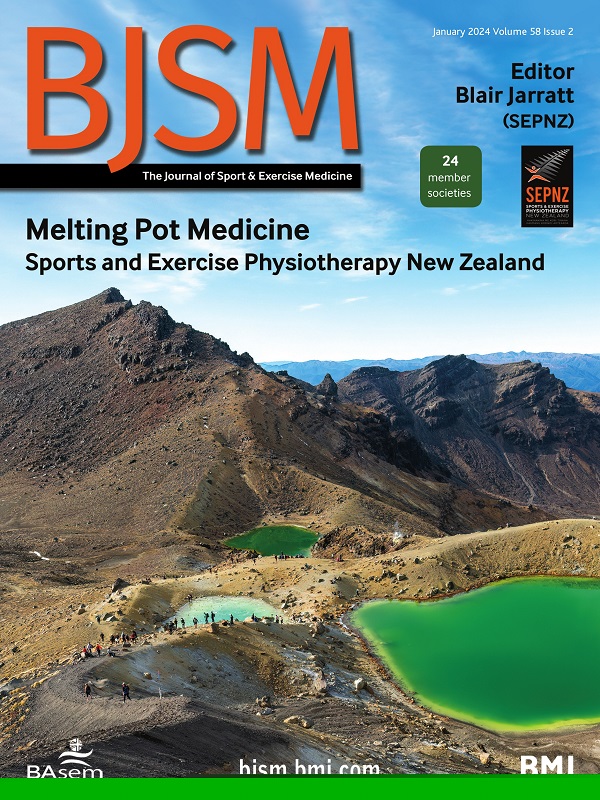Associations of abusive supervision among collegiate athletes from equity-deserving groups
IF 11.6
1区 医学
Q1 SPORT SCIENCES
引用次数: 0
Abstract
Objective To examine differences in abusive/supportive coach supervision experienced by collegiate athletes across race/ethnicity, gender, sexual orientation and disability; determine the impact of coach characteristics on abusive supervision prevalence; and explore outcomes related to team culture, athlete autonomy, perceived coach leadership skills and perceived concern for athletes’ well-being. Methods Cross-sectional analysis of the 2021–2022 National Collegiate Athletic Association (NCAA) myPlaybook survey on 3317 athletes (aged ≥18 years). The survey captured self-reported demographics, sport type (team vs individual, lean vs non-lean) and multiple validated measures reflecting abusive/supportive coaching styles. Structural equation modelling identified associations while controlling for confounders. Results Overall, 18.6% (n=618) of athletes reported some form of abusive supervision. After adjusting for covariates, participating in team sport (OR=1.10, 95% CI 1.03 to 1.17) and having a disability (OR=1.17, 95% CI 1.04 to 1.31) were associated with higher odds of reporting abusive supervision. No significant differences were found based on athlete race/ethnicity, gender identity or sexual orientation. Coaches demonstrating attentiveness to athletes’ needs (OR=0.82, 95% CI 0.73 to 0.92) and respect for their input (OR=0.89, 95% CI 0.80 to 1.00) had lower odds of reported abusive supervision. Conclusion Nearly one-fifth of this NCAA cohort experienced abusive coach supervision. Disability and team sport participation were significantly associated with increased reports, whereas race/ethnicity, gender identity or sexual orientation showed no significant differences. In disabled and team sport athletes, sustained verbal/non-verbal abuse had a negative impact on athletes’ perception of team culture, autonomy, coaches’ leadership skills and coaches’ concern for their well-being. Coaching and leadership styles remain critical educational targets for providing safe sport environments for all athletes. All data relevant to the study are included in the article or uploaded as supplementary information.来自公平群体的大学运动员滥用监管的关联
目的探讨不同种族/民族、性别、性取向和残疾大学生运动员在教练员虐待/支持性监督方面的差异;确定教练员特征对虐待监督发生率的影响;并探讨与团队文化、运动员自主性、感知教练领导技能和感知运动员幸福感相关的结果。方法对2021-2022年全国大学生体育协会(NCAA) myPlaybook调查3317名年龄≥18岁的运动员进行横断面分析。该调查收集了自我报告的人口统计数据、运动类型(团队vs个人、精益vs非精益)以及反映滥用/支持教练风格的多种有效措施。结构方程模型在控制混杂因素的同时确定了关联。结果总体而言,18.6% (n=618)的运动员报告了某种形式的虐待监管。在调整协变量后,参加团队运动(OR=1.10, 95% CI 1.03至1.17)和有残疾(OR=1.17, 95% CI 1.04至1.31)与报告虐待监管的较高几率相关。运动员的种族/民族、性别认同或性取向没有显著差异。表现出对运动员需求的关注(OR=0.82, 95% CI 0.73至0.92)和对运动员投入的尊重(OR=0.89, 95% CI 0.80至1.00)的教练被报告为虐待监管的几率较低。近五分之一的NCAA研究对象经历过教练的虐待监督。残疾和团体运动的参与与报告的增加显著相关,而种族/民族、性别认同或性取向没有显著差异。在残疾和团队运动运动员中,持续的语言/非语言虐待对运动员对团队文化的感知、自主性、教练的领导技能和教练对他们福祉的关注有负面影响。教练和领导风格仍然是为所有运动员提供安全运动环境的重要教育目标。所有与研究相关的数据都包含在文章中或作为补充信息上传。
本文章由计算机程序翻译,如有差异,请以英文原文为准。
求助全文
约1分钟内获得全文
求助全文
来源期刊
CiteScore
27.10
自引率
4.90%
发文量
217
审稿时长
3-8 weeks
期刊介绍:
The British Journal of Sports Medicine (BJSM) is a dynamic platform that presents groundbreaking research, thought-provoking reviews, and meaningful discussions on sport and exercise medicine. Our focus encompasses various clinically-relevant aspects such as physiotherapy, physical therapy, and rehabilitation. With an aim to foster innovation, education, and knowledge translation, we strive to bridge the gap between research and practical implementation in the field. Our multi-media approach, including web, print, video, and audio resources, along with our active presence on social media, connects a global community of healthcare professionals dedicated to treating active individuals.

 求助内容:
求助内容: 应助结果提醒方式:
应助结果提醒方式:


